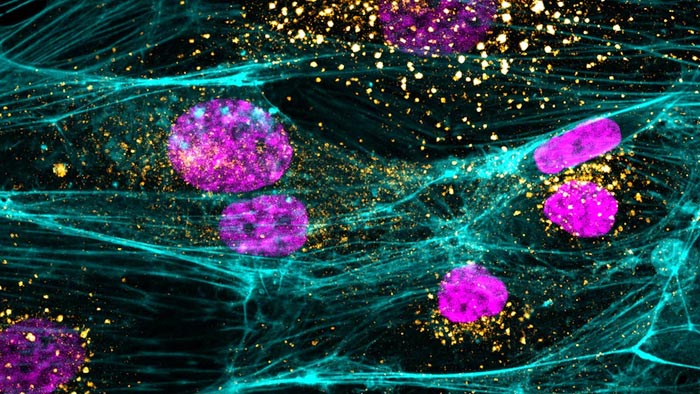Vascular disease in COVID-19 is not caused by viral infection of blood vessels

SARS-CoV-2 virus added to cells
Credit: Institute for Molecular Bioscience, The University of Queensland
The SARS-CoV-2 virus does not infect blood vessels, despite the high risk of blood clots to COVID-19 patients, University of Queensland researchers have found.
Dr Emma Gordon and Dr Larisa Labzin from UQ’s Institute for Molecular Bioscience and Dr Kirsty Short from UQ’s School of Chemistry and Molecular Biosciences pooled their expertise in vascular biology and virology to determine how the virus causes damage to blood vessels.
The researchers found that the cardiovascular complications of COVID-19 are triggered by inflammation caused by infected airway cells.
“At least 40 per cent of patients that are hospitalised with COVID-19 are at high risk of blood clots, and anti-coagulation therapies are now being routinely used,” Dr Gordon said.
“There have been many studies attempting to prove whether the virus is infecting cells of the inner blood vessel wall or not.
“By conducting our experiments using real, infectious virus rather than fragments of the virus’s spike protein, we can definitively say it is not.”
The researchers used UQ’s sophisticated microscopy facilities to track where the virus travelled in the cells and visualise how blood vessels respond to the live virus.
Immunologist Dr Labzin said the body’s inflammatory response had a big effect on the cardiovascular system because they work together to fight infection – the blood delivers the immune cells to the site of infection and makes blood clots if the blood vessel is damaged.
“When our immune system works well, it clears the virus from our bodies,” Dr Labzin said.
“But sometimes it goes into overdrive and we get an overblown inflammatory response causing complications –in the case of COVID-19, this is often blood clots, when there shouldn’t be any.
“Knowing that it is inflammation causing these cardiovascular complications arising from COVID-19 rather than the virus itself will help us develop the right treatments, and a better understanding of how and why these complications arise.”
Heart Foundation interim CEO, Professor Garry Jennings said the study helps clarify a key debate about the relationship between the virus and the lining of the blood vessels.
“How the cells lining the blood vessels sense the virus and the damage to nearby cells is still not completely understood,” he said.
“There is more research to do, but this study is an important step in our understanding of the virus and which cells and mechanisms we should look at next.”
This research is published in Clinical and translational Immunology .
This work was supported by a Future Leader Fellowship (104692) from the National Heart Foundation of Australia and the National Health and Medical Research Council.
Explainer video: https://youtu.be/zk8PHO0LBPo
Journal: Clinical & Translational Immunology
DOI: 10.1002/cti2.1350
Method of Research: Experimental study
Subject of Research: Cells
Article Title: Endothelial cells are not productively infected by SARS-CoV-2
Article Publication Date: 24-Oct-2021
Media Contact
Bronwyn Adams
University of Queensland
b.adams@imb.uq.edu.au
Office: 61-733-462-134
Cell: +61 4 5757 6843
All latest news from the category: Life Sciences and Chemistry
Articles and reports from the Life Sciences and chemistry area deal with applied and basic research into modern biology, chemistry and human medicine.
Valuable information can be found on a range of life sciences fields including bacteriology, biochemistry, bionics, bioinformatics, biophysics, biotechnology, genetics, geobotany, human biology, marine biology, microbiology, molecular biology, cellular biology, zoology, bioinorganic chemistry, microchemistry and environmental chemistry.
Newest articles

Trotting robots reveal emergence of animal gait transitions
A four-legged robot trained with machine learning by EPFL researchers has learned to avoid falls by spontaneously switching between walking, trotting, and pronking – a milestone for roboticists as well…

Innovation promises to prevent power pole-top fires
Engineers in Australia have found a new way to make power-pole insulators resistant to fire and electrical sparking, promising to prevent dangerous pole-top fires and reduce blackouts. Pole-top fires pose…

Possible alternative to antibiotics produced by bacteria
Antibacterial substance from staphylococci discovered with new mechanism of action against natural competitors. Many bacteria produce substances to gain an advantage over competitors in their highly competitive natural environment. Researchers…





















